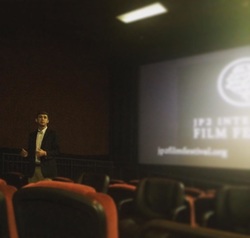|
As a follow-up to making the film, I am preparing a research paper on the complex inter-relationships between surviving childhood trauma and telling one's story whilst growing up adrift in Europe after World War II.
The relief of Jewish survivors was palpable as the Allies and Soviets advanced on Germany and they were liberated. However, many forget that they often had no homes or families to return to, that survivors often did not know the fate of children, parents, brothers, sisters or other family and friends. Also, in the chaos that followed, and deep in hiding, many survivors did not realize immediately that the war was over or what lay in store. Further, Jewish Child Survivors were amongst many orphans and stranded survivors as national borders were being redrawn and governments re-established. It would be many years before the survivors of the War would find permanent homes and even feel 'at home'. Meanwhile, in Europe and across the world, people were finally confronted with the unmistakable reality of the Holocaust (until then, despite the news, there was much denial) and society was trying to come to grips with what happened and what it meant.
0 Comments
Unfortunately I cannot attend the Warsaw Jewish Film Festival, school work is too pressing and the cost of tickets don't permit it. As I prepare a short thank you and welcome ahead of tomorrow's screening it is a chance to reflect on my journey.
Warsaw is my home, I grew up there and love the certain grittiness combined with its parks and humid air. Warsaw is one of those cities where you know you have arrived. Warsaw had the largest Jewish community, if I am not mistaken, in Europe prior to the Shoah. It was a vibrant and chaotic metropolis with a vibrant and diverse Jewish community. Yiddish, Hebrew, German, Polish could all be heard in Warsaw's Jewish community, all different social, religious and political groups. Now though, this diversity is a faded memory, brought back to life by the Polin: Museum of the History of Polish Jews. The Polin Museum is one of the most incredible Museum's recently built and it had an enormous task: recreating a portrait of Jewish life for the length of Poland's 1000 year Jewish history. I volunteered at the Museum for two summers while its main program was being finished. I learned a lot about Jewish culture, but worked pre-dominantly on a few projects - translating some of the diary entries related to the Warsaw Ghetto Uprising and preparing an educational course on Jan Karski. At the same time, I was researching Child Survivors. Warsaw for me changed over those two years of making and shooting the film and, truth be told, the experience has not fully settled yet. During my research and after interviewing the Child Survivors I became haunted by different images - sometimes seeing a Jewish child smuggled out of the ghetto or imagining Adam Shtibel's arrival in 1947 to tell his story and try and settle down again, all alone. My father wondered to me how people could have re-inhabited the Ghetto area after the war. And as we traveled around Poland finding forlorn Jewish cemeteries and converted Jewish homes that no one has claimed, you can't help but be faced with the emptiness that still exists. If one pays even a small amount of attention it is still there. This is why Picking Up the Pieces showing in Warsaw is so important. I imagine as the testimony of the survivors is spoken in Warsaw that it will help fill a space that has been absent and bring voices - maybe not exactly those of the survivors I've interviewed but their brethren - back. As Henryk Grynberg said, "We must tell, and continue to tell this story." As the work of the Warsaw Jewish Film Festival, other Jewish institutions and the Polin Museum continues more and more of this empty space will become available. And the story of a wonderful, diverse, vibrant and unique culture will be more available to us.  It was a great joy to be at yesterday's screening of Picking Up the Pieces with my grandfather. We were in Miami at the John Paul II Interfaith Film Festival. It is hard to understate the tragedy of the Holocaust, and there are many hidden dimensions the psychological struggle to recover and lead productive lives after this tragedy. JP2 Interfaith Film Festival has a focus on exploring spirituality in film, and afterwards the audience brought up the issue of the questioning one's faith in God, an experience that most child survivors experienced during the Holocaust and/or their recovery. Every survivor speaks for him or herself, I would not want to generalize about their conclusions. But during my interview it was clear that whatever their conclusions, faith and identity have become intertwined with painful memory for survivors. |
JOSHUA TEBEAUWriter, Director & Producer, Picking Up the Pieces Archives
January 2016
Categories |
 RSS Feed
RSS Feed